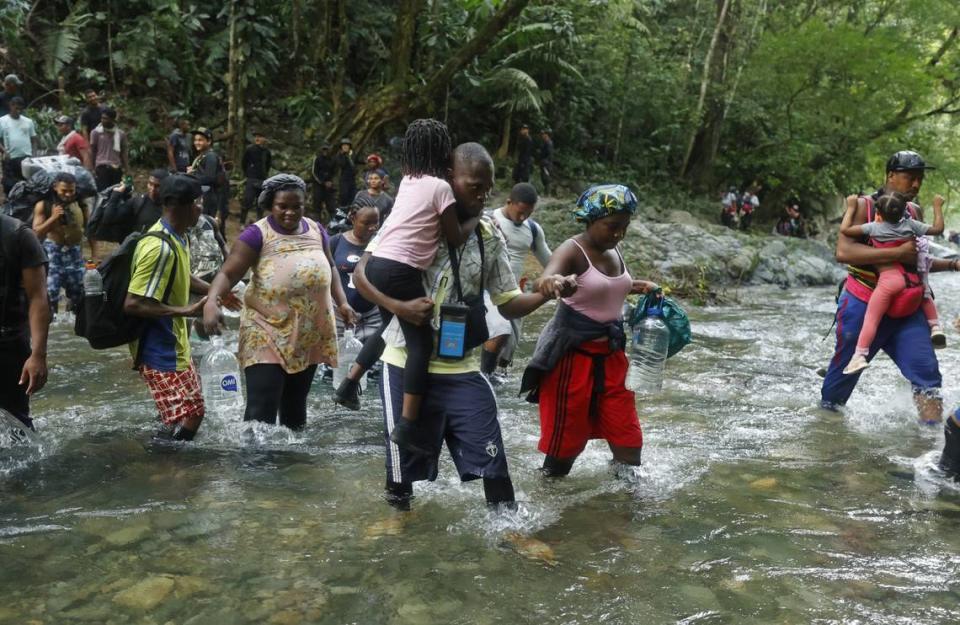U.S., Panama, Colombia agree to crack down on one of world’s most dangerous migrant crossings
A U.S. decision to launch a two-month campaign with Colombia and Panama to curb illegal migration through South America’s most dangerous migrant crossing is being driven by concerns that a shift in U.S. immigration policy next month could lead to a surge of asylum-seekers at the southwest border, a Biden administration official said.
On May 11, the Trump-era public-health order known as Title 41, which allows the U.S. to quickly expel migrants at the southwest border back to Mexico or their home countries, will end. The U.S. will return to regular immigration processing for asylum seekers, in which those seeking to enter without pre-authorization will face a five-year ban on entry, said Katie Tobin, special assistant to President Biden and senior director of the Transborder Directorate at the National Security Council.
To get to the U.S. border, many migrants cross through a dangerous jungle corridor on the border between Colombia and Panama known as the Darien Gap. The U.S. wants to discourage such crossings, which have continued to spike, and target criminal networks profiting off the desperation of undocumented migrants.
“We know that these criminal actors are using the shift in U.S. policy to seek to generate business, facilitate irregular migration north,” Tobin said on a call with reporters. “And so we really view the timing of this announcement and our joint effort at the Darien as an important piece of our broader approach to ensure that we do not have a surge or irregular migration toward the southwest border.”
The joint effort emerged from high-level talks earlier this week in Panama City between Panamanian Foreign Minister Janaina Tewaney, Colombian Foreign Minister Alvaro Leyva Duran and U.S. Homeland Security Secretary Alejandro Mayorkas. The three met to discuss the increased crossings by undocumented migrants through the Darien Gap.

Tobin said the details of the campaign are still being worked on, but efforts will focus on countering human smuggling and trafficking by focusing on “enhancing arrests, prosecutions and other efforts to disrupt human smuggling.”
“Transnational criminal organizations, cartels that have gotten into the business of moving people, are charging thousands of dollars for this dangerous journey through the Darien and they’re using disinformation through social media to entice clients, customers,” she said.
The Darien Gap is one of the most dangerous migrant crossings in the world. An unknown number of Haitians, Venezuelans, Africans and people from countries across the world lose their lives each year as they attempt to cross from Colombia to Panama to make it to Mexico to enter the United States.
Despite recent efforts by the U.S. to open up new legal pathways for some immigrants and discourage migrants from coming to the southwest border, the crossings have continued. According to Panamanian migration officials nearly 88,000 people crossed the Darien jungle in just the first three months of this year, which is six times the number for the same period as last year.
These individuals include nationals from Haiti and as well as Venezuela, many of them children.
Last month, UNICEF reported that one in five migrants walking through the Darien jungle were children, the fastest-growing group among people fleeing their homes under the threat of violence or migrating in search of better opportunities. Their numbers represented a seven-fold increase in the first two months of this year, compared to the same period as last year, the United Nations children’s agency said.
“We share a conviction with Panama and Colombia and other countries in the region that we have to do more to end this exploitation of human lives,” said Tobin. “Many people that are vulnerable are fleeing really terrible situations and then are being exploited.... The loss of life, the rampant sexual assault, there’s just a strong feeling that we have to do something about this to protect the lives of migrants.”
